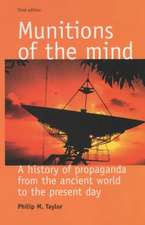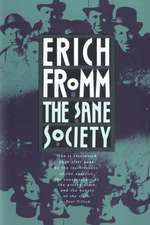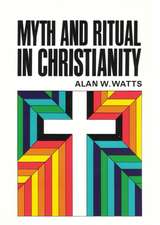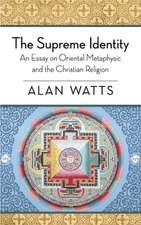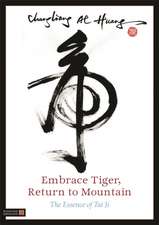The Wisdom of Insecurity: A Message for an Age of Anxiety
Autor Alan W. Wattsen Limba Engleză Paperback – 31 ian 2011
Alan W. Watts’s “message for an age of anxiety” is as powerful today as it was when this modern classic was first published.
We spend too much time trying to anticipate and plan for the future; too much time lamenting the past. We often miss the pleasures of the moment in our anxious efforts to ensure the next moment is as enjoyable. Drawing from Eastern philosophy and religion, Watts argues that it is only by acknowledging what we do not and cannot know, that we can find something truly worth knowing. In order to lead a fulfilling life, one must embrace the present—live fully in the now.
Elegantly reasoned and lucidly written, this philosophical achievement contains all the wisdom and spirit that distinguished Watts’s long career and resonates with us still.
Preț: 88.83 lei
Nou
Puncte Express: 133
Preț estimativ în valută:
16.100€ • 17.87$ • 14.04£
16.100€ • 17.87$ • 14.04£
Carte disponibilă
Livrare economică 26 martie-09 aprilie
Livrare express 12-18 martie pentru 24.98 lei
Preluare comenzi: 021 569.72.76
Specificații
ISBN-13: 9780307741202
ISBN-10: 0307741206
Pagini: 152
Dimensiuni: 130 x 203 x 15 mm
Greutate: 0.18 kg
Editura: Vintage Books USA
ISBN-10: 0307741206
Pagini: 152
Dimensiuni: 130 x 203 x 15 mm
Greutate: 0.18 kg
Editura: Vintage Books USA
Notă biografică
Alan W. Watts, who held both a master’s degree in theology and a doctorate of divinity, is best remembered as an interpreter of Zen Buddhism in particular, and of Indian and Chinese philosophy in general. Standing apart, however, from sectarian membership, he has earned the reputation of being one of the most original and “unrutted” philosophers of the twentieth century. Watts was the author of some twenty books on the philosophy and psychology of religion that have been published in many languages throughout the world, including the bestselling The Way of Zen. An avid lecturer, Watts appeared regularly on the radio and hosted the popular television series, Eastern Wisdom and Modern Life, in the 1960s. He died in 1973.
Extras
I. THE AGE OF ANXIETY
By ALL OUTWARD APPEARANCES OUR LIFE IS A SPARK of light between one eternal darkness and another. Nor is the interval between these two nights an unclouded day, for the more we are able to feel pleasure, the more we are vulnerable to pain—and, whether in background or foreground, the pain is always with us. We have been accustomed to make this existence worthwhile by the belief that there is more than the outward appearance—that we live for a future beyond this life here. For the outward appearance does not seem to make sense. If living is to end in pain, incompleteness, and nothingness, it seems a cruel and futile experience for beings who are born to reason, hope, create, and love. Man, as a being of sense, wants his life to make sense, and he has found it hard to believe that it does so unless there is more than what he sees—unless there is an eternal order and an eternal life behind the uncertain and momentary experience of life-and-death.
I may not, perhaps, be forgiven for introducing sober matters with a frivolous notion, but the problem of making sense out of the seeming chaos of experience reminds me of my childish desire to send someone a parcel of water in the mail. The recipient unties the string, releasing the deluge in his lap. But the game would never work, since it is irritatingly impossible to wrap and tie a pound of water in a paper package. There are kinds of paper which won't disintegrate when wet, but the trouble is to get the water itself into any manageable shape, and to tie the string without bursting the bundle.
The more one studies attempted solutions to problems in politics and economics, in art, philosophy, and religion, the more one has the impression of extremely gifted people wearing out their ingenuity at the impossible and futile task of trying to get the water of life into neat and permanent packages.
There are many reasons why this should be particularly evident to a person living today. We know so much about history, about all the packages which have been tied and which have duly come apart. We know so much detail about the problems of life that they resist easy simplification, and seem more complex and shapeless than ever. Furthermore, science and industry have so increased both the tempo and the violence of living that our packages seem to come apart faster and faster every day.
There is, then, the feeling that we live in a time of unusual insecurity. In the past hundred years so many long-established traditions have broken down—traditions of family and social life, of government, of the economic order, and of religious belief. As the years go by, there seem to be fewer and fewer rocks to which we can hold, fewer things which we can regard as absolutely right and true, and fixed for all time.
To some this is a welcome release from the restraints of moral, social, and spiritual dogma. To others it is a dangerous and terrifying breach with reason and sanity, tending to plunge human life into hopeless chaos. To most, perhaps, the immediate sense of release has given a brief exhilaration, to be followed by the deepest anxiety. For if all is relative, if life is a torrent without form or goal in whose flood absolutely nothing save change itself can last, it seems to be something in which there is "no future" and thus no hope.
Human beings appear to be happy just so long as they have a future to which they can look forward—whether it be a "good time" tomorrow or an everlasting life beyond the grave. For various reasons, more and more people find it hard to believe in the latter. On the other hand, the former has the disadvantage that when this "good time" arrives, it is difficult to enjoy it to the full without some promise of more to come. If happiness always depends on something expected in the future, we are chasing a will-o'-the-wisp that ever eludes our grasp, until the future, and ourselves, vanish into the abyss of death.
As a matter of fact, our age is no more insecure than any other. Poverty, disease, war, change, and death are nothing new. In the best of times "security" has never been more than temporary and apparent. But it has been possible to make the insecurity of human life supportable by belief in unchanging things beyond the reach of calamity—in God, in man's immortal soul, and in the government of the universe by eternal laws of right.
Today such convictions are rare, even in religious circles. There is no level of society, there must even be few individuals, touched by modern education, where there is not some trace of the leaven of doubt. It is simply self-evident that during the past century the authority of science has taken the place of the authority of religion in the popular imagination, and that scepticism, at least in spiritual things, has become more general than belief.
The decay of belief has come about through the honest doubt, the careful and fearless thinking of highly intelligent men of science and philosophy. Moved by a zeal and reverence for facts, they have tried to see, understand, and face life as it is without wishful thinking. Yet for all that they have done to improve the conditions of life, their picture of the universe seems to leave the individual without ultimate hope. The price of their miracles in this world has been the disappearance of the world-to-come, and one is inclined to ask the old question, "What shall it profit a man if he gain the whole world and lose his soul?" Logic, intelligence, and reason are satisfied, but the heart goes hungry. For the heart has learned to feel that we live for the future. Science may, slowly and uncertainly, gives us a better future—for a few years. And then, for each of us, it will end. It will all end. However long postponed, everything composed must decompose.
Despite some opinions to the contrary, this is still the general view of science. In literary and religious circles it is now often supposed that the conflict between science and belief is a thing of the past. There are even some rather wishful scientists who feel that when modern physics abandoned a crude atomistic materialism, the chief reasons for this conflict were removed. But this is not at all the case. In most of our great centers of learning, those who make it their business to study the full implications of science and its methods are as far as ever from what they understand as a religious point of view.
Nuclear physics and relativity have, it is true, done away with the old materialism, but they now give us a view of the universe in which there is even less room for ideas of any absolute purpose or design. The modern scientist is not so naive as to deny God because he cannot be found with a telescope, or the soul because it is not revealed by the scalpel. He has merely noted that the idea of God is logically unnecessary. He even doubts that it has any meaning. It does not help him to explain anything which he cannot explain in some other, and simpler, way.
He argues that if everything which happens is said to be under the providence and control of God, this actually amounts to saying nothing. To say that everything is governed and created by God is like saying, "Everything is up,"—which means nothing at all. The notion does not help us to make any verifiable predictions, and so, from the scientific standpoint, is of no value whatsoever. Scientists may be right in this respect. They may be wrong. It is not our purpose here to argue this point. We need only note that such scepticism has immense influence, and sets the prevailing mood of the age.
What science has said, in sum, is this: We do not, and in all probability cannot, know whether God exists. Nothing that we do know suggests that he does, and all the arguments which claim to prove his existence are found to be without logical meaning. There is nothing, indeed, to prove that there is no God, but the burden of proof rests with those who propose the idea. If, the scientists would say, you believe in God, you must do so on purely emotional grounds, without basis in logic or fact. Practically speaking, this may amount to atheism. Theoretically, it is simple agnosticism. For it is of the essence of scientific honesty that you do not pretend to know what you do not know, and of the essence of scientific method that you do not employ hypotheses which cannot be tested.
The immediate results of this honesty have been deeply unsettling and depressing. For man seems to be unable to live without myth, without the belief that the routine and drudgery, the pain and fear of this life have some meaning and goal in the future. At once new myths come into being—political and economic myths with extravagant promises of the best of futures in the present world. These myths give the individual a certain sense of meaning by making him part of a vast social effort, in which he loses something of his own emptiness and loneliness. Yet the very violence of these political religions betrays the anxiety beneath them—for they are but men huddling together and shouting to give themselves courage in the dark.
Once there is the suspicion that a religion is a myth, its power has gone. It may be necessary for man to have a myth, but he cannot self-consciously prescribe one as he can mix a pill for a headache. A myth can only "work" when it is thought to be truth, and man cannot for long knowingly and intentionally "kid" himself.
Even the best modern apologists for religion seem to overlook this fact. For their most forceful arguments for some sort of return to orthodoxy are those which show the social and moral advantages of belief in God. But this does not prove that God is a reality. It proves, at most, that believing in God is useful. "If God did not exist, it would be necessary to invent him." Perhaps. But if the public has any suspicion that he does not exist, the invention is in vain.
It is for this reason that most of the current return to orthodoxy in some intellectual circles has a rather hollow ring. So much of it is more a belief in believing than a belief in God. The contrast between the insecure, neurotic, educated "modern" and the quiet dignity and inner peace of the old-fashioned believer, makes the latter a man to be envied. But it is a serious misapplication of psychology to make the presence or absence of neurosis the touchstone of truth, and to argue that if a man's philosophy makes him neurotic, it must be wrong. "Most atheists and agnostics are neurotic, whereas most simple Catholics are happy and at peace with themselves. Therefore the views of the former are false, and of the latter true."
Even if the observation is correct, the reasoning based on it is absurd. It is as if to say, "You say there is a fire in the basement. You are upset about it. Because you are upset, there is obviously no fire." The Agnostic, the sceptic, is neurotic. but this does not imply a false philosophy; it implies the discovery of facts to which he does not know how to adapt himself. The intellectual who tries to escape from neurosis by escaping from the facts is merely acting on the principle that "where ignorance is bliss, 'tis folly to be wise."
When belief in the eternal becomes impossible, and there is only the poor substitute of belief in believing, men seek their happiness in the joys of time. However much they may try to bury it in the depths of their minds, they are well aware that these joys are both uncertain and brief. This has two results. On the one hand, there is the anxiety that one may be missing something, so that the mind flits nervously and greedily from one pleasure to another, without finding rest and satisfaction in any. On the other, the frustration of having always to pursue a future good in a tomorrow which never comes, and in a world where everything must disintegrate, gives men an attitude of "What's the use anyhow?"
Consequently our age is one of frustration, anxiety, agitation, and addiction to "dope." Somehow we must grab what we can while we can, and drown out the realization that the whole thing is futile and meaningless. This "dope" we call our high standard of living, a violent and complex stimulation of the senses, which makes them progressively less sensitive and thus in need of yet more violent stimulation. We crave distraction—a panorama of sights, sounds, thrills, and titillations into which as much as possible must be crowded in the shortest possible time.
To keep up this "standard" most of us are willing to put up with lives that consist largely in doing jobs that are a bore, earning the means to seek relief from the tedium by intervals of hectic and expensive pleasure. These intervals are supposed to be the real living, the real purpose served by the necessary evil of work. Or we imagine that the justification of such work is the rearing of a family to go on doing the same kind of thing, in order to rear another family . . . and so ad infinitum.
By ALL OUTWARD APPEARANCES OUR LIFE IS A SPARK of light between one eternal darkness and another. Nor is the interval between these two nights an unclouded day, for the more we are able to feel pleasure, the more we are vulnerable to pain—and, whether in background or foreground, the pain is always with us. We have been accustomed to make this existence worthwhile by the belief that there is more than the outward appearance—that we live for a future beyond this life here. For the outward appearance does not seem to make sense. If living is to end in pain, incompleteness, and nothingness, it seems a cruel and futile experience for beings who are born to reason, hope, create, and love. Man, as a being of sense, wants his life to make sense, and he has found it hard to believe that it does so unless there is more than what he sees—unless there is an eternal order and an eternal life behind the uncertain and momentary experience of life-and-death.
I may not, perhaps, be forgiven for introducing sober matters with a frivolous notion, but the problem of making sense out of the seeming chaos of experience reminds me of my childish desire to send someone a parcel of water in the mail. The recipient unties the string, releasing the deluge in his lap. But the game would never work, since it is irritatingly impossible to wrap and tie a pound of water in a paper package. There are kinds of paper which won't disintegrate when wet, but the trouble is to get the water itself into any manageable shape, and to tie the string without bursting the bundle.
The more one studies attempted solutions to problems in politics and economics, in art, philosophy, and religion, the more one has the impression of extremely gifted people wearing out their ingenuity at the impossible and futile task of trying to get the water of life into neat and permanent packages.
There are many reasons why this should be particularly evident to a person living today. We know so much about history, about all the packages which have been tied and which have duly come apart. We know so much detail about the problems of life that they resist easy simplification, and seem more complex and shapeless than ever. Furthermore, science and industry have so increased both the tempo and the violence of living that our packages seem to come apart faster and faster every day.
There is, then, the feeling that we live in a time of unusual insecurity. In the past hundred years so many long-established traditions have broken down—traditions of family and social life, of government, of the economic order, and of religious belief. As the years go by, there seem to be fewer and fewer rocks to which we can hold, fewer things which we can regard as absolutely right and true, and fixed for all time.
To some this is a welcome release from the restraints of moral, social, and spiritual dogma. To others it is a dangerous and terrifying breach with reason and sanity, tending to plunge human life into hopeless chaos. To most, perhaps, the immediate sense of release has given a brief exhilaration, to be followed by the deepest anxiety. For if all is relative, if life is a torrent without form or goal in whose flood absolutely nothing save change itself can last, it seems to be something in which there is "no future" and thus no hope.
Human beings appear to be happy just so long as they have a future to which they can look forward—whether it be a "good time" tomorrow or an everlasting life beyond the grave. For various reasons, more and more people find it hard to believe in the latter. On the other hand, the former has the disadvantage that when this "good time" arrives, it is difficult to enjoy it to the full without some promise of more to come. If happiness always depends on something expected in the future, we are chasing a will-o'-the-wisp that ever eludes our grasp, until the future, and ourselves, vanish into the abyss of death.
As a matter of fact, our age is no more insecure than any other. Poverty, disease, war, change, and death are nothing new. In the best of times "security" has never been more than temporary and apparent. But it has been possible to make the insecurity of human life supportable by belief in unchanging things beyond the reach of calamity—in God, in man's immortal soul, and in the government of the universe by eternal laws of right.
Today such convictions are rare, even in religious circles. There is no level of society, there must even be few individuals, touched by modern education, where there is not some trace of the leaven of doubt. It is simply self-evident that during the past century the authority of science has taken the place of the authority of religion in the popular imagination, and that scepticism, at least in spiritual things, has become more general than belief.
The decay of belief has come about through the honest doubt, the careful and fearless thinking of highly intelligent men of science and philosophy. Moved by a zeal and reverence for facts, they have tried to see, understand, and face life as it is without wishful thinking. Yet for all that they have done to improve the conditions of life, their picture of the universe seems to leave the individual without ultimate hope. The price of their miracles in this world has been the disappearance of the world-to-come, and one is inclined to ask the old question, "What shall it profit a man if he gain the whole world and lose his soul?" Logic, intelligence, and reason are satisfied, but the heart goes hungry. For the heart has learned to feel that we live for the future. Science may, slowly and uncertainly, gives us a better future—for a few years. And then, for each of us, it will end. It will all end. However long postponed, everything composed must decompose.
Despite some opinions to the contrary, this is still the general view of science. In literary and religious circles it is now often supposed that the conflict between science and belief is a thing of the past. There are even some rather wishful scientists who feel that when modern physics abandoned a crude atomistic materialism, the chief reasons for this conflict were removed. But this is not at all the case. In most of our great centers of learning, those who make it their business to study the full implications of science and its methods are as far as ever from what they understand as a religious point of view.
Nuclear physics and relativity have, it is true, done away with the old materialism, but they now give us a view of the universe in which there is even less room for ideas of any absolute purpose or design. The modern scientist is not so naive as to deny God because he cannot be found with a telescope, or the soul because it is not revealed by the scalpel. He has merely noted that the idea of God is logically unnecessary. He even doubts that it has any meaning. It does not help him to explain anything which he cannot explain in some other, and simpler, way.
He argues that if everything which happens is said to be under the providence and control of God, this actually amounts to saying nothing. To say that everything is governed and created by God is like saying, "Everything is up,"—which means nothing at all. The notion does not help us to make any verifiable predictions, and so, from the scientific standpoint, is of no value whatsoever. Scientists may be right in this respect. They may be wrong. It is not our purpose here to argue this point. We need only note that such scepticism has immense influence, and sets the prevailing mood of the age.
What science has said, in sum, is this: We do not, and in all probability cannot, know whether God exists. Nothing that we do know suggests that he does, and all the arguments which claim to prove his existence are found to be without logical meaning. There is nothing, indeed, to prove that there is no God, but the burden of proof rests with those who propose the idea. If, the scientists would say, you believe in God, you must do so on purely emotional grounds, without basis in logic or fact. Practically speaking, this may amount to atheism. Theoretically, it is simple agnosticism. For it is of the essence of scientific honesty that you do not pretend to know what you do not know, and of the essence of scientific method that you do not employ hypotheses which cannot be tested.
The immediate results of this honesty have been deeply unsettling and depressing. For man seems to be unable to live without myth, without the belief that the routine and drudgery, the pain and fear of this life have some meaning and goal in the future. At once new myths come into being—political and economic myths with extravagant promises of the best of futures in the present world. These myths give the individual a certain sense of meaning by making him part of a vast social effort, in which he loses something of his own emptiness and loneliness. Yet the very violence of these political religions betrays the anxiety beneath them—for they are but men huddling together and shouting to give themselves courage in the dark.
Once there is the suspicion that a religion is a myth, its power has gone. It may be necessary for man to have a myth, but he cannot self-consciously prescribe one as he can mix a pill for a headache. A myth can only "work" when it is thought to be truth, and man cannot for long knowingly and intentionally "kid" himself.
Even the best modern apologists for religion seem to overlook this fact. For their most forceful arguments for some sort of return to orthodoxy are those which show the social and moral advantages of belief in God. But this does not prove that God is a reality. It proves, at most, that believing in God is useful. "If God did not exist, it would be necessary to invent him." Perhaps. But if the public has any suspicion that he does not exist, the invention is in vain.
It is for this reason that most of the current return to orthodoxy in some intellectual circles has a rather hollow ring. So much of it is more a belief in believing than a belief in God. The contrast between the insecure, neurotic, educated "modern" and the quiet dignity and inner peace of the old-fashioned believer, makes the latter a man to be envied. But it is a serious misapplication of psychology to make the presence or absence of neurosis the touchstone of truth, and to argue that if a man's philosophy makes him neurotic, it must be wrong. "Most atheists and agnostics are neurotic, whereas most simple Catholics are happy and at peace with themselves. Therefore the views of the former are false, and of the latter true."
Even if the observation is correct, the reasoning based on it is absurd. It is as if to say, "You say there is a fire in the basement. You are upset about it. Because you are upset, there is obviously no fire." The Agnostic, the sceptic, is neurotic. but this does not imply a false philosophy; it implies the discovery of facts to which he does not know how to adapt himself. The intellectual who tries to escape from neurosis by escaping from the facts is merely acting on the principle that "where ignorance is bliss, 'tis folly to be wise."
When belief in the eternal becomes impossible, and there is only the poor substitute of belief in believing, men seek their happiness in the joys of time. However much they may try to bury it in the depths of their minds, they are well aware that these joys are both uncertain and brief. This has two results. On the one hand, there is the anxiety that one may be missing something, so that the mind flits nervously and greedily from one pleasure to another, without finding rest and satisfaction in any. On the other, the frustration of having always to pursue a future good in a tomorrow which never comes, and in a world where everything must disintegrate, gives men an attitude of "What's the use anyhow?"
Consequently our age is one of frustration, anxiety, agitation, and addiction to "dope." Somehow we must grab what we can while we can, and drown out the realization that the whole thing is futile and meaningless. This "dope" we call our high standard of living, a violent and complex stimulation of the senses, which makes them progressively less sensitive and thus in need of yet more violent stimulation. We crave distraction—a panorama of sights, sounds, thrills, and titillations into which as much as possible must be crowded in the shortest possible time.
To keep up this "standard" most of us are willing to put up with lives that consist largely in doing jobs that are a bore, earning the means to seek relief from the tedium by intervals of hectic and expensive pleasure. These intervals are supposed to be the real living, the real purpose served by the necessary evil of work. Or we imagine that the justification of such work is the rearing of a family to go on doing the same kind of thing, in order to rear another family . . . and so ad infinitum.
Recenzii
“Reading Alan Watts challenges us to explore new avenues of thinking, inspires us to lead more fulfilling lives. His legacy lives on in The Wisdom of Insecurity, a work that energetically displays Watts’s piercing intellect, razor-sharp wit, and winning grace. For the clarity and wisdom with which it engages timeless concerns crucial to us all, it is unmatched. An important book.”
—Greg Mortenson, author of Three Cups of Tea
“Perhaps the foremost interpreter of Eastern disciplines for the contemporary West, Watts had the rare gift of ‘writing beautifully the unwritable.’”
—Los Angeles Times
“The wisdom of insecurity is not a way of evasion, but of carrying on wherever we happen to be stationed—carrying on, however, without imagining that the burden of the world, or even of the next moment, is ours. It is a philosophy not of nihilism but of the reality of the present—always remembering that to be of the present is to be, and candidly know ourselves to be, on the crest of a breaking wave.”
—Philip Wheelwright, Arts and Letters
“This book proposes a complete reversal of all ordinary thinking about the present state of man. The critical condition of the world compels us to face this problem: how is man to live in a world in which he can never be secure, deprived, as many are, of the consolations of religious belief? The author shows that this problem contains its own solution—that the highest happiness, the supreme spiritual insight and certitude are found only in our awareness that impermanence and insecurity are inescapable and inseparable from life. Written in a simple and lucid style, it is a timely message.”
—Book Exchange (London)
—Greg Mortenson, author of Three Cups of Tea
“Perhaps the foremost interpreter of Eastern disciplines for the contemporary West, Watts had the rare gift of ‘writing beautifully the unwritable.’”
—Los Angeles Times
“The wisdom of insecurity is not a way of evasion, but of carrying on wherever we happen to be stationed—carrying on, however, without imagining that the burden of the world, or even of the next moment, is ours. It is a philosophy not of nihilism but of the reality of the present—always remembering that to be of the present is to be, and candidly know ourselves to be, on the crest of a breaking wave.”
—Philip Wheelwright, Arts and Letters
“This book proposes a complete reversal of all ordinary thinking about the present state of man. The critical condition of the world compels us to face this problem: how is man to live in a world in which he can never be secure, deprived, as many are, of the consolations of religious belief? The author shows that this problem contains its own solution—that the highest happiness, the supreme spiritual insight and certitude are found only in our awareness that impermanence and insecurity are inescapable and inseparable from life. Written in a simple and lucid style, it is a timely message.”
—Book Exchange (London)
Cuprins
Introduction by Deepak Chopra
Preface by Alan W. Watts
1. The Age of Anxiety
2. Pain and Time
3. The Great Stream
4. The Wisdom of the Body
5. On Being Aware
6. The Marvelous Moment
7. The Transformation of Life
8. Creative Morality
9. Religion Reviewed
Preface by Alan W. Watts
1. The Age of Anxiety
2. Pain and Time
3. The Great Stream
4. The Wisdom of the Body
5. On Being Aware
6. The Marvelous Moment
7. The Transformation of Life
8. Creative Morality
9. Religion Reviewed
Descriere
Drawing from Eastern philosophy and religion, Watts argues that it is only by acknowledging what we do not and cannot know that we can find something truly worth knowing. In order to lead a fulfilling life, one must embrace the present--live fully in the now.
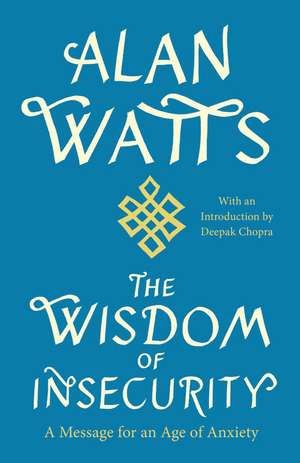




![The Way of Zen =: [Zendao]](https://i0.books-express.ro/bt/9780375705106/the-way-of-zen.jpg)


